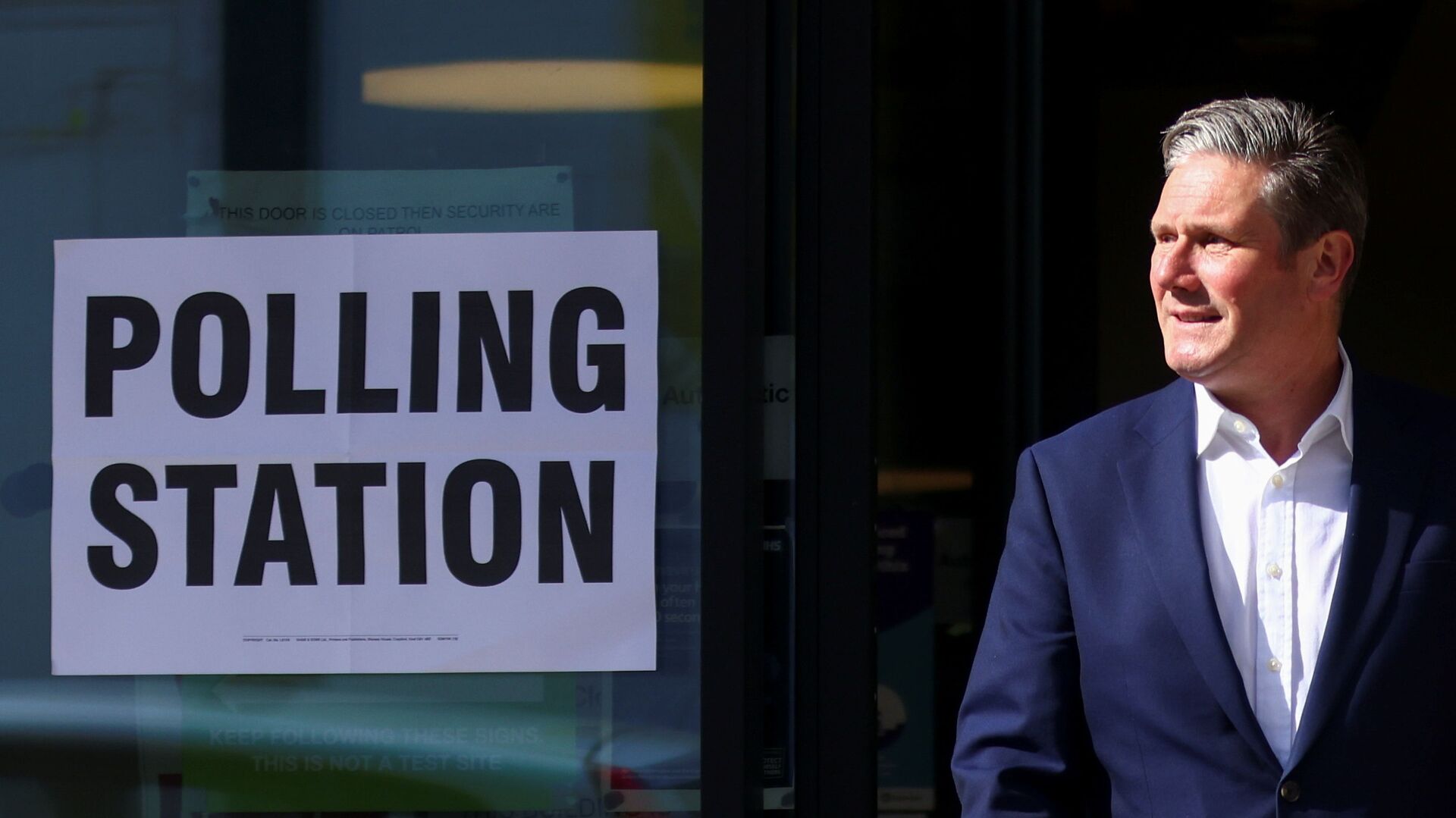https://sputnikglobe.com/20211020/could-uk-electoral-boundary-changes-doom-labour-to-eternal-opposition-1090072984.html
Could UK Electoral Boundary Changes Doom Labour to Eternal Opposition?
Could UK Electoral Boundary Changes Doom Labour to Eternal Opposition?
Sputnik International
The boundary commissions of England, Wales, Scotland and Northern Ireland periodically redraw constituency borders to bring the number of voters in each... 20.10.2021, Sputnik International
2021-10-20T16:40+0000
2021-10-20T16:40+0000
2021-10-20T16:40+0000
britain
great britain
tony blair
boris johnson
gordon brown
british conservative party
british labour party
public opinion polls
uk electoral commission
keir starmer
https://cdn1.img.sputnikglobe.com/img/07e5/05/07/1082824141_0:0:2699:1518_1920x0_80_0_0_82492a30ed6011f97f7cd924cf0d69b2.jpg
Changes to the UK's electoral boundaries could make it near-impossible for the Labour Party to get back into office.According to analysts Election Maps UK, the proposed redrawing of the country's 650 Parliamentary constituencies would leave Sir Keir Starmer's official opposition with even more of an uphill battle to win the next election.The site published a projected election map based on the draft changes, showing Prime Minister Boris Johnson's Tories would increase their majority by 16 seats, mostly at the expense of Labour.The pundits predicted Labour would need a 12-point poll lead to win a Parliamentary majority, but the Conservatives would only need a five-point margin.Recent opinion polls show the Tories holding a fluctuating but significant lead over Labour in the wake of the annual party conference season, despite the ongoing COVID-19 pandemic, outbreaks of fuel and food panic-buying and a series of ministerial scandals.Reclaim Party leader Laurence Fox speculated that it could be the end of the Labour Party, already riven by left-right divisions.The boundary commissions of England, Wales, Scotland and Northern Ireland periodically review the borders of the seats, with the aim of bringing the number of voters in each roughly into line. English constituencies currently average 72,200 electors, while the figure for Northern Ireland is 68,300, Scotland 67,200 and Labour stronghold Wales just 56,000.But left-wingers and opponents of Brexit accused the Tories of gerrymandering — and worse.Labour lost more than 40 seats in its traditional northern 'Red Wall' strongholds in the December 2019 election, after adopting policy at its September conference of re-running the 2016 referendum on leaving the European Union, with then-shadow Brexit Secretary Starmer leading the charge.But since 2015 the Scottish National Party SNP has won most of the 59 seats in Scotland, formerly a Labour stronghold, making the official opposition’s chances of winning an election far more difficult.Labour has not won an election since 2005, when leader Tony Blair led the party to its third successive victory on a much-reduced share of the vote from the 1997 landslide. Blair was forced to resign two years later, to be replaced by his chancellor of the exchequer Gordon Brown. Brown mooted a snap election in the autumn of 2007, but dropped the idea after securing support from trade unions at that year's party conference. His popularity declined after the 2008 financial crisis and his government's austerity cuts to pay for the cost of rescuing major banks.
https://sputnikglobe.com/20210926/suicide-pact-top-labour-remainer-says-party-should-campaign-to-re-join-eu-1089429364.html
britain
great britain
Sputnik International
feedback@sputniknews.com
+74956456601
MIA „Rosiya Segodnya“
2021
James Tweedie
https://cdn1.img.sputnikglobe.com/img/07e4/08/1c/1080307270_0:3:397:400_100x100_80_0_0_7777393b9b18802f2e3c5eaa9cbcc612.png
James Tweedie
https://cdn1.img.sputnikglobe.com/img/07e4/08/1c/1080307270_0:3:397:400_100x100_80_0_0_7777393b9b18802f2e3c5eaa9cbcc612.png
News
en_EN
Sputnik International
feedback@sputniknews.com
+74956456601
MIA „Rosiya Segodnya“
Sputnik International
feedback@sputniknews.com
+74956456601
MIA „Rosiya Segodnya“
James Tweedie
https://cdn1.img.sputnikglobe.com/img/07e4/08/1c/1080307270_0:3:397:400_100x100_80_0_0_7777393b9b18802f2e3c5eaa9cbcc612.png
britain, great britain, tony blair, boris johnson, gordon brown, british conservative party, british labour party, public opinion polls, uk electoral commission, keir starmer, independent electoral and boundaries commission (iebc), viral
britain, great britain, tony blair, boris johnson, gordon brown, british conservative party, british labour party, public opinion polls, uk electoral commission, keir starmer, independent electoral and boundaries commission (iebc), viral
Could UK Electoral Boundary Changes Doom Labour to Eternal Opposition?
The boundary commissions of England, Wales, Scotland and Northern Ireland periodically redraw constituency borders to bring the number of voters in each roughly into line. Scotland, Wales and Northern Ireland currently elect more MPs per head of capita than England, where the ruling Conservatives have almost all their seats.
Changes to the UK's electoral boundaries could make it near-impossible for the Labour Party to get back into office.
According to analysts Election Maps UK, the proposed redrawing of the country's 650 Parliamentary constituencies would leave
Sir Keir Starmer's official opposition with even more of an uphill battle to win the next election.
The site published a
projected election map based on the draft changes, showing Prime Minister
Boris Johnson's Tories would increase their majority by 16 seats, mostly at the expense of Labour.
The pundits predicted Labour would need a 12-point poll lead to win a Parliamentary majority, but the Conservatives would only need a five-point margin.
Recent opinion polls show the Tories holding a fluctuating but significant lead over Labour in the wake of the annual party conference season, despite the ongoing COVID-19 pandemic, outbreaks of fuel and food panic-buying and a series of ministerial scandals.

26 September 2021, 19:20 GMT
Reclaim Party leader Laurence Fox speculated that it could be the end of the Labour Party, already riven by left-right divisions.
The boundary commissions of England, Wales, Scotland and Northern Ireland periodically
review the borders of the seats, with the aim of bringing the number of voters in each roughly into line. English constituencies currently average 72,200 electors, while the figure for Northern Ireland is 68,300, Scotland 67,200 and Labour stronghold Wales just 56,000.
But left-wingers and opponents of Brexit accused the Tories of gerrymandering — and worse.
Labour lost more than 40 seats in its traditional
northern 'Red Wall' strongholds in the December 2019 election, after adopting policy at its September conference of re-running the 2016 referendum on leaving the European Union, with then-shadow Brexit Secretary Starmer leading the charge.
But since 2015 the Scottish National Party SNP has won most of the 59 seats in Scotland, formerly a Labour stronghold, making the official opposition’s chances of winning an election far more difficult.
Labour has not won an election since 2005, when leader Tony Blair led the party to its third successive victory on a much-reduced share of the vote from the 1997 landslide. Blair was forced to resign two years later, to be replaced by his chancellor of the exchequer Gordon Brown.
Brown mooted a snap election in the autumn of 2007, but dropped the idea after securing support from trade unions at that year's party conference. His popularity declined after the 2008 financial crisis and his government's austerity cuts to pay for the cost of rescuing major banks.





